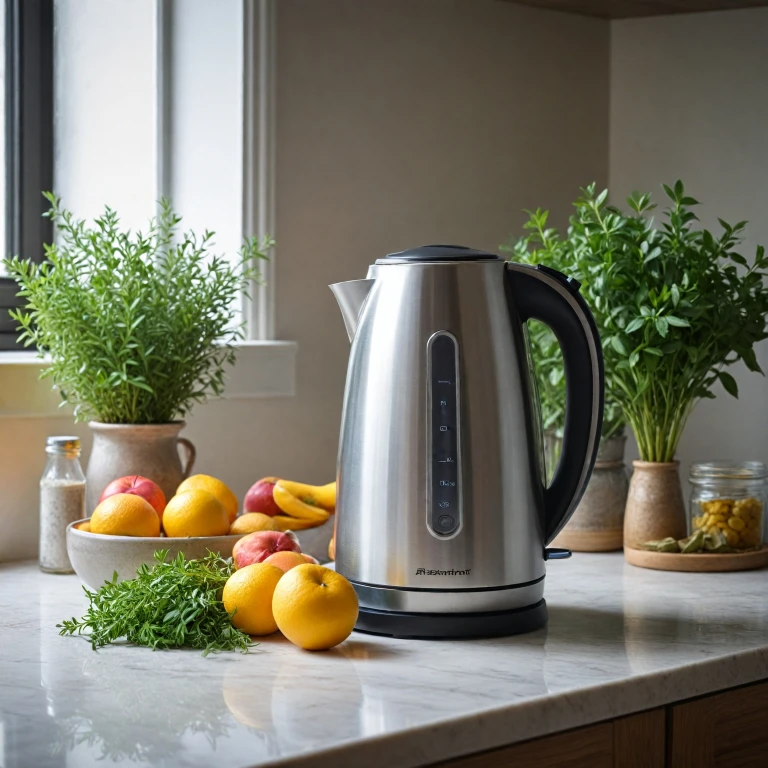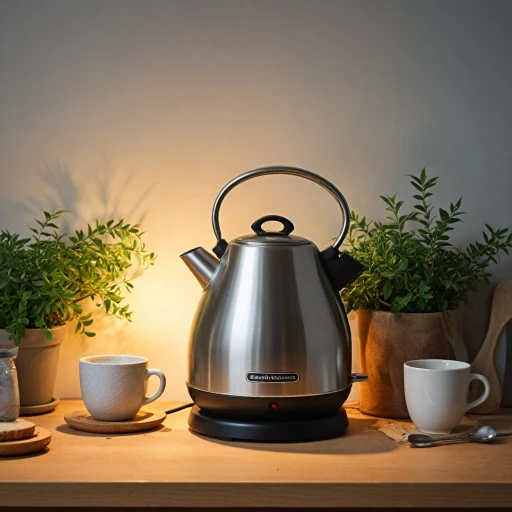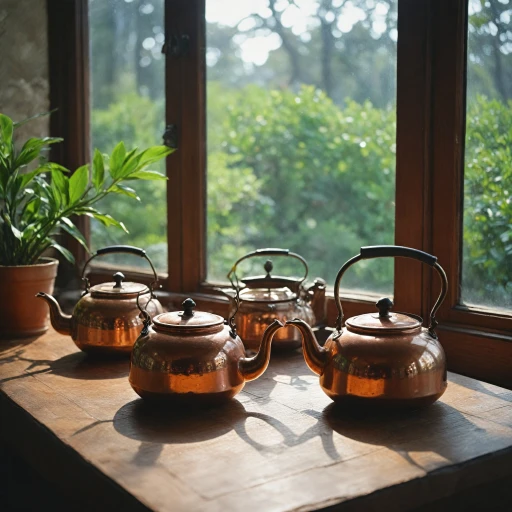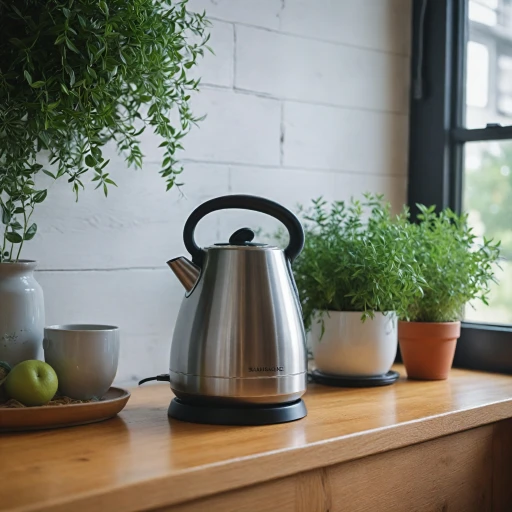Understanding Non-Toxic Materials in Electric Kettles
Recognizing Safe Materials in Electric Kettles
Choosing the best electric kettle for boiling water while ensuring it's safe and healthy involves understanding the materials used in its construction. The core idea is to find options that prioritize non-toxic materials, guaranteeing the safety and wellbeing of users. One of the primary considerations is opting for kettles made from stainless steel or borosilicate glass. These materials are favored for their durability and absence of toxic chemicals. Stainless steel kettles are renowned for their robust structure and resistance to rust or stain, making them excellent for everyday use. On the other hand, borosilicate glass kettles provide an elegant look and allow users to see the boiling water, which adds to the aesthetic appeal while maintaining health standards. Avoiding plastic components in kettles is crucial for those seeking non-toxic alternatives. Plastics can sometimes contain BPA and other harmful substances that may leach into the boiling water, especially when exposed to high heat repeatedly. Thus, choosing a plastic-free kettle ensures a minimal risk of chemical exposure. Ceramic electric kettles, while not as common, offer another safe option. These kettles often come with a pleasing design and do not interact with the water, maintaining its purity. Furthermore, features like temperature control and dry protection add to the appeal of non-toxic electric kettles by providing an additional safety layer during use. Explore more on selecting a safe electric kettle for deeper insights into making informed choices.Key Features to Look for in a Non-Toxic Electric Kettle
Essential Characteristics for a Non-Toxic Kettle
When selecting an electric kettle, prioritizing non-toxic materials is crucial for health and safety. Here are some key features to consider:
- Material Composition: Opt for kettles made from stainless steel, borosilicate glass, or ceramic. These materials are generally considered safe and free from harmful chemicals. Avoid plastic components, especially those that come into contact with boiling water, as they can leach toxic substances.
- BPA-Free: Ensure the kettle is labeled as BPA-free. Bisphenol A (BPA) is a chemical found in some plastics that can pose health risks. A BPA-free kettle reduces the risk of chemical exposure.
- Temperature Control: Some electric kettles offer temperature control settings, which are beneficial for brewing different types of tea and coffee. This feature allows you to heat water to the desired temperature without overheating, preserving the flavor and quality of your beverages.
- Auto Shut-Off and Boil-Dry Protection: Safety features like auto shut-off and boil-dry protection prevent the kettle from overheating or boiling dry, which can damage the appliance and pose a fire hazard.
- Ergonomic Design: Look for kettles with a comfortable handle and easy-pour spout to ensure safe and convenient use. A well-designed kettle minimizes the risk of spills and burns.
Considering these features will help you choose the best non-toxic electric kettle that suits your needs, ensuring both safety and convenience. For more insights into non-toxic materials, refer to our earlier discussion on understanding these materials in electric kettles.
Comparing Popular Non-Toxic Electric Kettle Brands
Top Non-Toxic Electric Kettle Brands Reviewed
Choosing the right electric kettle for your home involves more than just a quick browse at the best price. Many consumers prioritize safety and health, particularly when it comes to exposure to potentially toxic materials such as plastic. Here, we dive into a comparison of some popular non-toxic electric kettle brands that focus on materials like stainless steel, glass, and ceramic.
Stainless Steel Kettles
- Stainless Steel Kettles with Auto Shut Features: Known for their durability and long-lasting quality, stainless steel kettles are a common choice. They often come with helpful functions like auto shut-off and boil-dry protection. Brands offering high-quality stainless steel options provide BPA-free designs that ensure your boiling water remains safe.
Glass Kettles
- Borosilicate Glass Kettles: These kettles allow you to clearly see the water boil, ensuring no plastic touches your water. Made from robust borosilicate glass, they are lauded for being plastic-free and are easy to clean. Check for options with temperature control settings to improve your brewing precision for tea or coffee.
Ceramic Kettles
- Aesthetic and Safe Ceramic Options: Often appreciated for their stylish designs, ceramic kettles can add an interesting visual touch to your kitchen. Though typically heavier, they are favored for being free from toxic chemicals.
For a detailed exploration of the world of electric tea makers, you may wish to explore more brands and features that meet your desired balance between functionality and aesthetics in electric tea kettles. Choosing a non-toxic electric kettle enhances your experience, ensuring safe and enjoyable brews every time.
Benefits of Using a Non-Toxic Electric Kettle
The Perks of Opting for a Non-Toxic Electric Kettle
For those passionate about brewing the perfect cup of tea or coffee, the choice of an electric kettle offers numerous advantages, especially when focusing on health and safety. By selecting non-toxic materials, you can enjoy your favorite hot beverages without worrying about harmful chemicals. One of the foremost benefits is the peace of mind that comes from knowing your kettle is crafted from safe, non-reactive materials. Kettles made of stainless steel, borosilicate glass, and ceramic are examples of materials that typically do not leach unwanted substances into boiling water. Unlike plastic kettles, their non-toxic counterparts do not risk contaminating your water with BPA or other harmful chemicals. Non-toxic electric kettles also often come with advanced features such as temperature control, which is ideal for those who prefer precise brewing conditions for different types of tea and coffee. Whether you want the perfect temperature for a delicate green tea or a robust coffee brew, this feature ensures your drink is just right. Additionally, many non-toxic kettles include conveniences like auto shut-off and boil-dry protection. These safety features prevent the kettle from burning out by turning off when the water has boiled or when the kettle is accidentally turned on with no water inside. This not only extends the life of your kettle but adds an extra layer of safety in your kitchen. Finally, the durability of materials like stainless steel and quality glass often surpasses that of cheaper plastic alternatives, ensuring longevity and ultimately offering better value for your money. When investing in a kettle, considering these benefits could truly enhance your tea or coffee experience, making it both safer and more enjoyable.Common Misconceptions About Electric Kettle Safety
Addressing Misconceptions Around Electric Kettle Safety
When it comes to selecting an electric kettle, there are a few misconceptions that often arise concerning their safety. Understanding these can help ensure that you make the best choice when selecting a kettle for boiling water safely and efficiently.
First, one common misconception is that all kettles featuring plastic materials are inherently toxic. However, not all plastics used in kettles are harmful. Look for electric kettles labeled as BPA-free to ensure you're selecting a plastic-free option that does not leach any harmful substances when boiling water. Many consumers opt for alternatives such as stainless steel or borosilicate glass to further eliminate concerns related to plastics.
Another frequent myth is that more expensive electric tea kettles are automatically safer. While price can sometimes be indicative of quality, it is not a universal truth. There are many affordable options available on the market made from non-toxic materials like stainless steel and ceramic that offer excellent safety features such as boil-dry protection and auto shut-off.
It's also worth noting the belief that only manual temperature control offers the best option for safe boiling. Electric kettles equipped with digital temperature control provide precise temperature settings for tea and coffee enthusiasts, ensuring that the water doesn't get too hot. This method can prevent damaging the flavor of your favorite brew, eliminating the need to guess whether the boiling water is at the desired temperature.
Lastly, there's often confusion regarding the maintenance of an electric kettle and its impact on safety. Regularly cleaning and descaling your kettle, especially if it's made of materials like stainless steel or glass, ensures it operates efficiently and safely. A well-maintained kettle provides the best performance over time.
By debunking these misconceptions and focusing on what truly makes a kettle safe, you can make an informed decision when comparing different options. Take the time to read about the key features and explore established brands to find one that suits your personal preferences and price range, ensuring that tea or coffee time remains enjoyable and hazard-free.
Tips for Maintaining Your Non-Toxic Electric Kettle
Proper Care and Maintenance Techniques
To keep your non-toxic electric kettle in top condition, regular maintenance is key. Here's how you can ensure its longevity and performance:- Cleaning Process:
- Avoiding Plastic:
- Boil Dry Protection:
- Regular Inspections:
- Temperature Control Settings:



